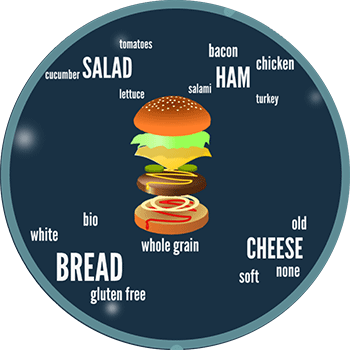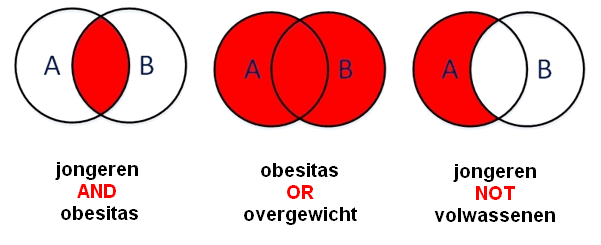How do you search?
In the previous steps, you have learned about orientation and choosing sources. Knowing exactly what you want to find out, and exactly where to find it, is really important. These pages are about how to search exactly, and we have some tips for you.
It is smart to use the so-called Boolean operators AND, OR and NOT. With these you can combine search terms and search more than one at a time, or exclude terms.
Example
If you were to order a sandwich the Boolean way, you would do the following: (bun OR sandwich) AND cheese AND lettuce AND ham NOT cucumber. You would get a bun or sandwich with cheese, lettuce, and ham, but no cucumber.

- AND. The AND operator allows you to combine search terms. When using AND between two search terms, the database only gives you results including both words, (no other results). For example, youths AND obesity
- OR. The OR operator allows you to get results with either one word or the other, or both. Useful for synonyms, abbreviations and related terms! Note: Always place search terms combined with OR between brackets/parenthesis. For example: (obesity OR overweight)
- NOT. The NOT operator allows you to exclude results.
For example, youths NOT adults

Note: In Google and in Google Scholar only the OR operator works. The AND operator is on automatically and the NOT operator works by placing a minus sign (for example, inception -movie)
Phrase search
Some concepts consist of two words such as, for example, "operational leadership" or "traumatic knee injury". Therefore it is important that a search engine like Google or a database can search exactly for your combination of words, by means of placing double " apostrophes".
Truncate
Sometimes a word has variants or you may want to search for singular or plural. You can do so by using a joker, or wild card.
For example, with the search assignment academ* you will find results with among other things the following search terms:
- academy
- academic
- academical
Masking
Does a word have different spelling variations? Then use the question mark in order to truncate.
For example, with a search on globali*ation you will find results for among other things:
- globalization
- globalisation
Most databases and search machines offer the possibility to define or limit your results. You can do this by, for example, indicating a date of publication (sometimes you do not want results from before 2016), setting a language or adding type of material (for example, searching only for peer-reviewed information).
In many databases (such as PubMed) and search engines (like Google) you will find an option for advanced search. With this you can set-up a structured search, combining boolean operators, combine with wild cards, date of publication and author. Very handy if you know exactly what you want
